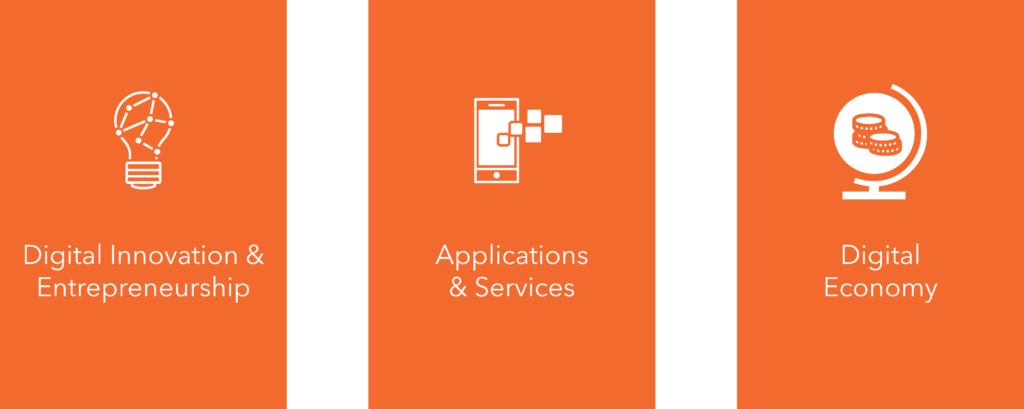To accelerate the digital transformation of societies through an inclusive whole-of-ecosystem approach to building digital ecosystems, action is required across three key pillars. These pillars, derived from the research and interviews conducted for this study and presented in Figure 23, are Digital innovation and entrepreneurship, Application and service, and Digital economy.

Under each pillar is a detailed list of issues to resolve to move towards meaningful connectivity for all. Below is an overview of these issues:
Digital innovation and entrepreneurship
A key driver and added value of the digital ecosystem is the creation of new digital tools, services and business models; however, the generation and development of these ideas are limited by:
- Insufficient innovation capability and capacity – advanced digital skills (e.g. AI/ML, coding, blockchain, design thinking, data literacy)
- Insufficient clarity on digital strengths/areas of focus at country level
- Limited numbers of initiatives that stimulate individuals to realize their potential to the fullest extent (e.g. mentorships, lab programmes, research projects, stakeholder networks, and innovation funds)
- No local start-up and innovation ecosystem (e.g. unclear national start-up act or holistic strategies fostering digital innovations across sectors)
- Lack of universities and TVET institutes as innovation hubs and entrepreneurial bodies
Application and services
In many LDCs, LLDCs and SIDS, the local communities are not enabled to introduce or contribute to activities that involve their needs and desires, and thus they cannot fully benefit from digital connectivity. To address this, there are various challenges that should be tackled:
- Incomplete and/or insecure digital public infrastructure (e.g. for payments, identity verification, and consent), putting the inclusion, privacy and protection of citizens at risk
- No digital services available beyond e-government
- Limited open-source content
- Few smart hubs (i.e. cities and villages) enabling digital and commercial connectivity
- Little co-creation with local communities and key stakeholders
- No data governance framework or usage principles for safeguarding and empowering citizens
Digital economy
Another positive aspect of digital ecosystems are the digital economies that people who are connected and empowered can gain from. Yet today, there are multiple barriers that are preventing people from partaking, namely:
- Lack of digital financial inclusion – low maturity and limited trust of online access and suite of government-led or private entities offering services
- Slower digitalization of B2B trade
- Low uptake of e-commerce
- Slower digitalization of supply chains, and cybersecurity risks
- Not enough national cybersecurity strategy definition and implementation globally
- Limited ability of MSMEs to tackle cybersecurity incidents
- Unsustainable practices and lack of a circular economy to deal with e-waste and prevent harm to the environment and human health
- Identity theft, financial fraud, illegal access
- Insufficient multistakeholder, multisector collaboration mechanisms aligned to national ambitions (e.g. ecosystem acceleration mechanism, tech parks, virtual park)
The following sub-sections consider these key issues in further detail. Issues that are closely related or similar in nature are explored jointly. A set of potential interventions to tackle these issues are also introduced. These interventions are not exhaustive and represent only a sample of ideas on how to address the VALUE CREATION challenge. All stakeholders are encouraged to consider additional actions to help bring the remaining 2.9 billion people online.